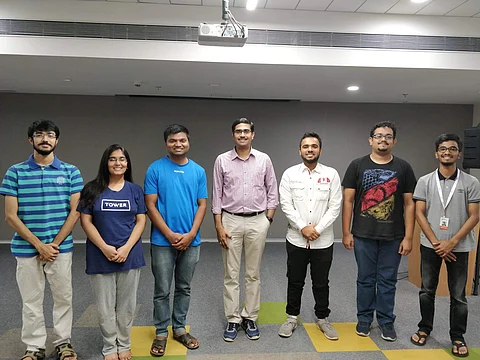Here's how these three engineering graduates developed a 'talking lamp' to help the visually impaired study better
Inclusivity must exist in all levels and grades of education, believes Akshita Sachdeva, co-founder of Trestle Labs in Bengaluru. She says, "While the visually impaired use Braille books to study until class X, what about books and study material at the college level? This is where our device Kibo plays an important role." But what led them to develop this essential and innovative device for visually impaired students is an interesting story.
When Bonny Dave, one of the founders, was studying engineering at Nirma University in Ahmedabad, he started volunteering with the Blind People's Association. He was shocked to see thick and big Braille books that the visually impaired read from. Following this, he used his engineering skills and developed a tactile actuator device that could help the visually impaired recognise the alphabet. Similarly, Abhishek Baghel, another founder, from Bharati Vidyapeeth's College of Engineering had built a brain-controlled wheelchair for people with physical disabilities. Meanwhile, Akshita who was a software engineer in Faridabad, developed hand gloves consisting of sensors and a camera that could help the visually impaired navigate easily. The camera placed on the index finger would read the board for them.
It was these like-minded ideas and an intention to create a social impact that brought these three engineers together at Digital Impact Square (DISQ), an organisation by the TATA Consultancy Services that grooms graduates and mentors them to become future digital entrepreneurs. Akshita explains, "When we applied to DISQ, the members who interviewed us understood that our common interest is to work on something that can serve as a boon to the specially-abled. Hence, they clubbed the three of us into a single team. During our research, we found out that most of the visually impaired students drop out as they don't get proper study materials once they reach college. That's when we started working to develop this device that we named Kibo. It is a Japanese word that means hope and this device serves as a hope for the blind."
So how does Kibo work? Realising the need for content accessibility, the trio has developed the device in such a way that it acts as a talking lamp. Akshita says, "Usually, when we read or study, we place a lamp on the table. For the visually impaired, Kibo acts as a study lamp that not only provides light on the book but also reads out from the book. Initially, we developed this device to only read printed material available in English. When we showed the device to the National Association for the Blind in Nashik they rejected it saying that they had already bought a similar device from the US that could read everything available in English. However, it could not read Marathi or Hindi, so it became rarely used by the institute."
The team went back to the drawing board. They spent a few more months programming the device to read all the prominent Indian languages — Hindi, Marathi, Gujarati, Bengali, Tamil, Telugu, Sanskrit, Malayalam, Kannada, Punjabi and more. She adds, "This inclusion of languages led us to have a pan India appeal and most of the educational institutions came forward to buy this device. Earlier, it could read printed content only but with the new programming, the device can read even handwritten material. Students can scan handwritten notes using Kibo which, in turn, reads the text. Another advantage is that it weighs only 400 grams so that it can be carried easily wherever you travel."
The team has also developed an app by the same name. The Kibo app can be downloaded from Google Play Store by the visually impaired and it is useful for various purposes. Akshita, who has seen a rapid increase in downloads especially during the lockdown, says, "This app can be used by students who are preparing for competitive exams because it can access over 8.5 lakh books and supports over six file formats including scanned PDF. They can also capture or open images and read them out through audio. In the past few months, we have seen over 3,500 downloads."


